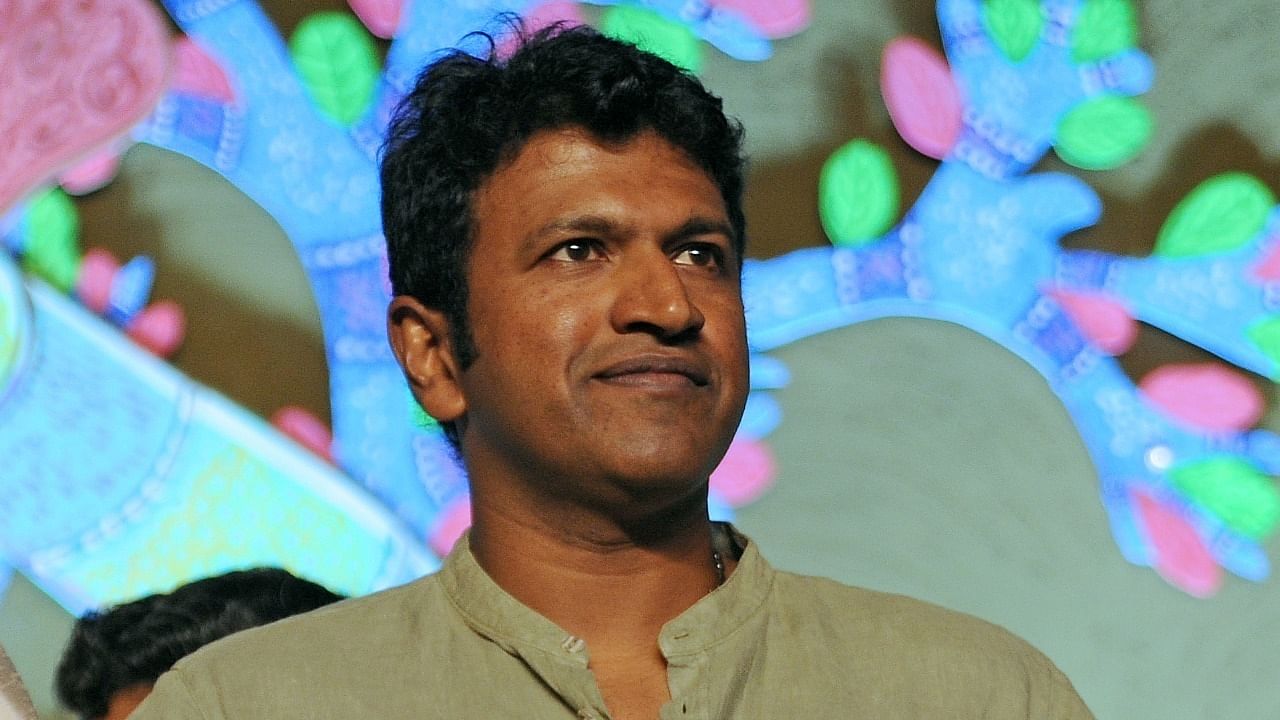
Puneeth Rajkumar, who died at 46 on Friday, was a dynamo of energy and one of south India’s most bankable stars.
It is tragic and ironic that he was gymming when he suffered a heart attack —- he was a role model for fitness buffs, and his workouts were legendary. In many hits, such as 'Appu' (2002), 'Vamshi' (2008), and 'Jackie' (2010), he deployed his athletic skills to full advantage. He took pride in doing his own stunts, and had trained in martial arts like Kalaripayattu to be able to do realistic action. Clearly, action was his first love, and he danced well, too.
Born into the first family of Kannada cinema, Puneeth, then called Lohith, debuted as a child actor when he was just six months old. He was noticed in the Rajkumar-Saritha film Chalisuva Modagalu (1982), in which he also sang a folksy number. In 'Bhakta Prahlada' (1983), he played the titular role, opposite Rajkumar, who plays the demonic Hiranyakashipu. Puneeth went on to win a national award for best child artiste for his role in 'Bettada Hoovu' (1985).
The youngest of Rajkumar and Parvathamma’s five children, Puneeth returned as a full-fledged hero with 'Appu' (2002). It fared spectacularly at the box office and inaugurated the second innings of a career that spanned nearly two decades and at least a dozen blockbuster hits. His 'Rajakumara' (2017) was the highest grossing Kannada film before it was overtaken by 'KGF' (2018).
Few child actors retain their charm when they grow up and try their luck as grown actors, but Puneeth was one who graduated to youth roles with chutzpah. Perhaps the only other child actor in India who became a sensation in his youth is Kamal Haasan.
Puneeth chose action and romance, and stayed away from gangster films, such as 'Om' (1995) and 'Jogi' (2004), that helped his elder brother Shivarajkumar score at the box office. In fact, Puneeth continued the legacy of his iconic father Rajkumar, doing films aimed at family audiences, and conforming to mainstream cinema’s idea of wholesome entertainment.
His sentimental love story 'Milana' (2007) came in the wake of the runaway rom-com 'Mungaru Male' (2006), and featured bhavageete-style lyrics and lilting melodies, staying away from the more aggressive music that had then caught on.
In his 29 films as hero, Puneeth played many roles —- upright official fighting the mining mafia ('Prithvi', 2010), NRI giving up wealth for the woman he loves ('Arasu', 2007), and student leader taking on the private education racket ('Yuvarathnaa') —- but one genre that he stayed away from was the mythological.
This is an operatic, rhetorical genre that Rajkumar excelled at, thanks to his training in classical music and company-drama acting conventions. Puneeth represented a later generation of English-educated heroes with little training in the traditional arts. His singing therefore was more casual Gaana than formal raga. In his screen image, he was to Kannada what Mahesh Babu is to Telugu, and Vijay is to Tamil.
A lover of world cinema, Puneeth was acutely aware of what producers and fans expected of him, and did not deviate from his do-gooder image. However, he sought to support more adventurous cinema with his production house PRK Productions and had just begun working with the maverick young director Pawan Kumar.
Puneeth took on a role similar to Amitabh Bachchan’s and hosted the TV quiz show ‘Kannadada Kotyadhipathi’. The gentleman presenter was not just a persona: his colleagues loved his friendly and easy manner and his fans were often astonished at how approachable and down to earth he could be.
Puneeth's untimely departure is a big shock not just to his family and friends but also to the Kannada film industry, only now recovering from the ravages of the pandemic.